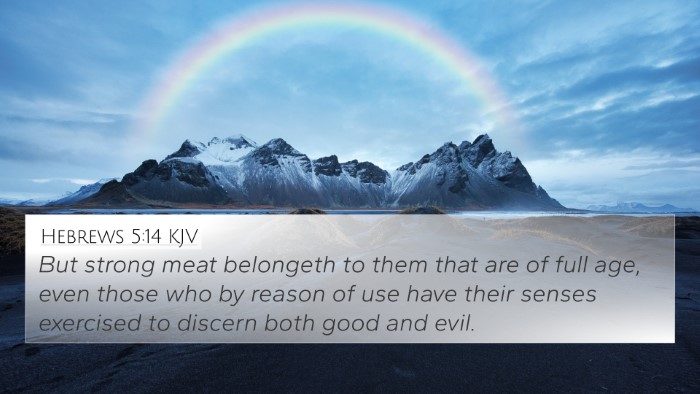Understanding Job 34:3
Job 34:3 states, "For the ear tests words as the palate tastes food." This verse highlights the critical nature of discernment in understanding and interpreting truth, much like how our palate distinguishes flavors.
Commentary Insights
Matthew Henry's Commentary
Matthew Henry suggests that this verse emphasizes the importance of our senses in seeking knowledge and judgment. Just as we rely on our taste to evaluate food, our hearing should allow us to assess the wisdom presented through words. This implies a thoughtful engagement with the truth, urging believers to filter and consider the words of wisdom they encounter.
Albert Barnes' Commentary
Albert Barnes points out that the verse illustrates the natural ability of humans to differentiate between good and evil by analogy. The 'ear' refers to the ability to listen and analyze, while the 'palate' relates to the idea of taste and preference. This signifies that spiritual wisdom must not be taken lightly; one must discern the essence of the teachings heard.
Adam Clarke's Commentary
Adam Clarke interprets the verse as a metaphor for the necessity of carefully considering what we hear. Just as we do not accept food without tasting it first, we must also critically analyze the information we receive. This critical thinking process is essential for grasping spiritual truths and should be applied to all teachings encountered during our faith journey.
Application and Context
This verse is situated in a section of the Book of Job where Elihu is addressing Job, reinforcing the idea that communication must be engaged with discernment. By comparing the process of hearing to tasting, this passage invites readers to reflect deeply on the words of wisdom encountered and to seek what is true and beneficial.
Cross-References
Job 34:3 connects with several other Bible verses that explore themes of discernment and understanding:
- Proverbs 2:2 - "Making your ear attentive to wisdom and inclining your heart to understanding."
- James 1:19 - "Let every person be quick to hear, slow to speak, slow to anger."
- 1 Thessalonians 5:21 - "But test everything; hold fast what is good."
- Proverbs 18:13 - "If one gives an answer before he hears, it is his folly and shame."
- Proverbs 1:5 - "Let the wise hear and increase in learning, and the one who understands obtain guidance."
- 1 John 4:1 - "Beloved, do not believe every spirit, but test the spirits to see whether they are from God."
- Luke 8:18 - "Take care then how you hear, for to the one who has, more will be given, and from the one who has not, even what he thinks that he has will be taken away."
Thematic Connections
The thematic connections between these verses emphasize a biblical principle: the importance of discernment in faith and understanding. Practicing discernment enriches one's spiritual journey by ensuring that beliefs and actions are rooted in truth.
Conclusion
Job 34:3 serves as a profound reminder of the need for careful listening and critical thinking in the pursuit of wisdom. The process of analyzing speech and understanding its implications parallels our journey in faith, urging believers to engage deeply with the teachings of Scripture.
Related Topics
This analysis encourages exploring various Bible verse cross-references, discovering the connections between Bible verses, and understanding thematic Bible verse connections. Practical resources for further study may include:
- Cross-reference Bible study
- Bible concordance
- Bible reference resources
- Tools for Bible cross-referencing
- Comprehensive Bible cross-reference materials
As you deepen your knowledge and understanding of the Scriptures, consider utilizing various Bible cross-reference guides to explore how different verses interconnect and support one another in conveying the rich tapestry of biblical truth.








